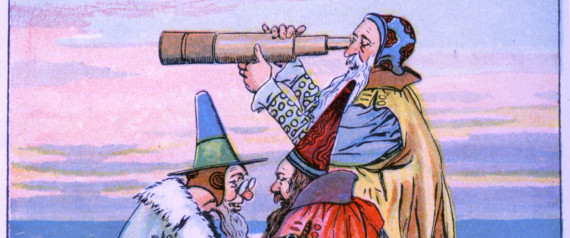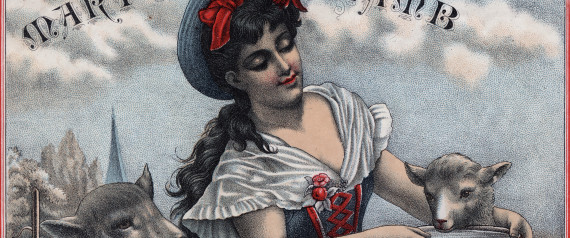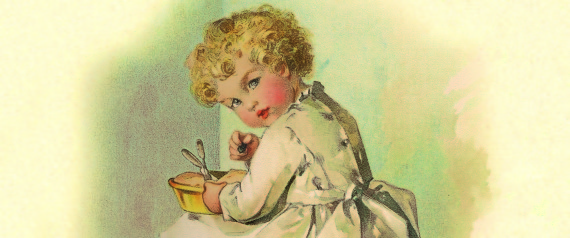
Dark backstories often lurk behind our favorite childhood songs and fairy tales. This shouldn't be so surprising. Childhood itself is a fairly recent invention, especially in its current form of G-rated entertainment and brightly colored, hazard-free toys, so the older a children’s story the more likely it has very adult, even unsavory roots.
Sometimes it’s easy, albeit shocking, to track down the un-bowdlerized originals. Early collections of fairy tales such as the famous Brothers Grimm compendium set down gruesome tales full of violence and violation, quite unlike our Disney-fied modern perceptions of Cinderella and Sleeping Beauty. Going further back is trickier. Were these frightening fables based on real events? In some cases, yes -- though it can be difficult to pin down which historical figures inspired these fictionalized tales.
Nursery rhymes may seem innocent -- what could poems meant for the nursery contain of violence or scandal? -- but the truth is more complex. Some nursery rhymes contain overt hints of cruelty or adult themes (see: “Ding, dong, bell / Pussy’s in the well / Who put her in? / Little Johnny Flynn” and “When down came a blackbird / And nipped off her nose”), suggesting that the composers of nursery rhymes weren’t always at pains to protect their young audience from frightening imagery.
That’s not all. Scholars have suggested that while certain nursery rhymes are simply nonsense songs or sweet poems, others may derive from political satire, ribald jokes or religious disputes. Though it’s difficult to verify any of these theories, here are some of the true backstories believed to have inspired popular nursery rhymes:
Baa Baa Black Sheep
Aw, how sweet -- a talking sheep with enough wool for everyone! Talking, generous animals must be the most appropriate fodder for children’s literature yet. Of course, there are some unpleasant theories as to the meaning of this rhyme. Perhaps the most convincing is that it dates back to feudal times and the institution of a harsh tax on wool in England. One-third would be taken for the king and nobility, and one-third for the church, leaving little for the farmers. Some early versions even end with “But none for the little boy / Who cries down the lane,” emphasizing the apparent complaint about the demands of the “master” and the “dame.”

Rub a Dub Dub
“Rub-a-dub-dub / Three men in a tub.” Okay, that already sounds a little odd, especially for an old children’s rhyme. But the modern iterations of this rhyme seem to be cleaned-up versions of the original, which described three girls in the tub: “Hey! rub-a-dub, ho! rub-a-dub, three maids in a tub / And who do you think were there? / The butcher, the baker, the candlestick-maker / And all of them gone to the fair.” Still not sure what’s going on? Some scholars believe this refers to a tawdry sideshow at a fair in which three naked girls are in a tub together -- and an extra bit of scandal is derived from the presence of three respectable townsfolk. Tsk, tsk, gentlemen. Now try to remember that the next time you read this cute rhyme to your little niece.
Ten Little Indians
“Ten Little Indians” should set off alarm bells in your head already -- why ten little Indians? -- even though it remains fairly common today. So it should put you on full red alert to hear that another variant of the rhyme took another group for its victims under the title “Ten Little N------”; it’s unclear which of the two came first, but both were used in minstrel shows starting in the late 19th century. Though the lyrics have been changed, the original verses (as you may remember from Agatha Christie’s Ten Little Indians, or And Then There Were None) referred to ten little Indians disappearing one by one -- often through violent accidents -- until there are none. The rhyme seems to slur Native Americans and black people (depending on the version) as shiftless, lazy, and not too bright, the cause of their own destruction. In either case, this is one nursery rhyme we’re better off eliminating from our repertoire.
The Muffin Man
Okay, this isn’t a twisted backstory, but a rather cheery one. In pre-supermarket days, fresh foods would have been purchased from individual vendors rather than one grocery store -- a butcher, a greengrocer … and muffin men, who went through the streets selling fresh muffins. A muffin man would usually ring a bell to advertise his wares, much as ice cream trucks now play tunes to entice children. Of course, in Victorian England, where this rhyme originated, the muffins were more similar to the flat, English variety. And no, it’s not about an animated muffin with arms and legs.

Mary Had a Little Lamb
An American nursery rhyme, “Mary Had a Little Lamb” is one of the few with a fairly clear, and innocuous, origin. The poem is attributed to Sarah Josepha Hale, and sprang from an incident in which a young girl named Mary Sawyer took her pet lamb to school. Mary later recalled being shown the poem by John Roulstone, a young man preparing for seminary who was visiting the school the morning of the lamb’s appearance. Though he was amused by the lamb’s presence and returned to show Mary the poem inspired by it, it’s believed that Hale wrote most or all of the poem.
Goosey Goosey Gander
“Goose” used to have a far more pejorative connotation than it does today; it was a slang term for “prostitute” in 16th century England. It’s unclear, however, if this is the meaning of the word in this rhyme. The later lines seem to refer to the persecution of Catholic priests by Henry VIII, who refused to “say their prayers” in the new, Anglican form. To avoid punishment for practicing their faith, priests would hide in “priest holes,” or tiny hidden chambers in the homes of sympathetic laymen. If they were found, the punishment was often death, as implied by the fate of the old man in the poem, who is “thrown down the stairs.” If the poem is, as it seems, an anti-Catholic jingle, the use of “goose” may be an insulting insinuation that the Church is whorish. Unfortunately (or fortunately?), there’s no clear evidence to confirm this... but the theory does make us view “Goosey Goosey Gander” in a much darker light.

Little Jack Horner
Though he’s only taking a plum out of a pie, Little Jack Horner does sound like he’s up to no good -- and anyway, who takes the filling out of a pie? Rude. It’s been widely speculated that there’s even more intrigue afoot here, with Little Jack standing in for Thomas Horner. Horner was a steward who was deputized to deliver a large pie to Henry VIII concealing deeds to a number of manors, a bribe from a Catholic abbot hoping to save his monastery from the king’s anti-Catholic crusade. Horner ended up with one of the manors for himself, and it’s believed by many that he reached into the pie and helped himself to a deed, though his descendants have insisted that he paid for the property fair and square.
Yankee Doodle
“Yankee Doodle went to town / Riding on a pony / Stuck a feather in his cap / And called it macaroni!” Though Americans, especially those in the Northeast, may call themselves Yanks proudly enough now, it’s clear that Yankee Doodle is a silly figure in this classic ditty, which dates back to the Revolutionary era. It actually seems like nonsense -- who would confuse a feather with elbow pasta? At the time, however, macaroni was the favored food of London dandies, and the word had come to refer to the height of fashion. British soldiers, who originally sang the verse, were insulting American colonists by implying they were such hicks they thought putting feathers in their hats made them as hip and stylish as London socialites. Ouch.

